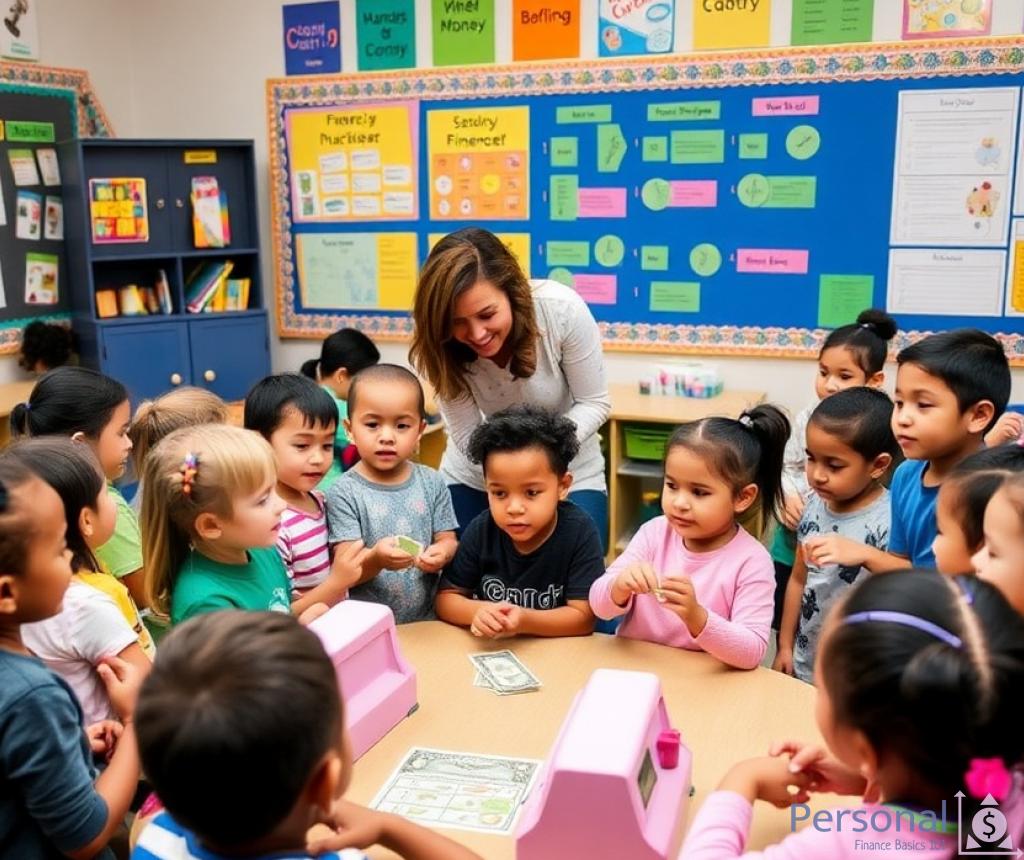Understanding the Basics of Entrepreneurship
Entrepreneurship is more than just starting a business; it is a mindset that involves identifying opportunities, taking risks, and creating value. It encompasses a range of activities that contribute to economic growth and innovation. By understanding the fundamentals of entrepreneurship, kids can learn to think critically and creatively, equipping them with valuable skills for the future.
Fostering an entrepreneurial mindset in children encourages them to approach challenges with a problem-solving attitude. This mindset is characterized by resilience, adaptability, and a willingness to learn from failure. By cultivating these traits, children gain the confidence to pursue their passions and turn their ideas into reality.
To provide kids with a comprehensive understanding of entrepreneurship, it is essential to break down its key components. The following list highlights the fundamental aspects that every young entrepreneur should know:
- Innovation: The ability to think creatively and develop new ideas.
- Market Research: Understanding customer needs and the competitive landscape.
- Business Planning: Creating a roadmap to achieve business goals.
- Financial Literacy: Knowing how to budget, save, and invest wisely.
- Networking: Building relationships that can support business endeavors.
By exploring these components, children can gain insights into what it takes to succeed as entrepreneurs and how to apply these lessons in real-world scenarios.
Cultivating Creative Problem-Solving Skills
In today’s rapidly evolving world, fostering creative problem-solving skills in children is essential for nurturing their entrepreneurial spirit. By encouraging kids to think beyond conventional solutions, we equip them with the tools necessary to tackle a variety of challenges. This empowerment not only prepares them for the business world but also enhances their ability to navigate everyday life with confidence and ingenuity.
One of the most effective ways to cultivate these skills is by promoting a culture of exploration and experimentation. When children are given the freedom to experiment with their ideas, they learn that failure is not the end but rather a stepping stone towards success. This mindset shift allows them to view obstacles as opportunities for growth. Schools and parents can play a pivotal role by providing environments where creativity is celebrated, and innovative thinking is encouraged. For instance, engaging kids in hands-on projects or real-world problem-solving scenarios can spark their imaginations and inspire them to develop unique solutions.
Moreover, fostering a collaborative environment can significantly enhance creative problem-solving abilities. When children work together on projects, they learn to appreciate diverse perspectives and brainstorm ideas collectively. This collaboration not only sharpens their critical thinking skills but also builds essential social skills such as communication and teamwork. By guiding them through group activities, whether in the classroom or at home, we teach them the value of collaboration in entrepreneurship. They discover that the best solutions often emerge from a blend of different ideas and viewpoints, reinforcing the notion that innovation thrives in a community.
Developing Financial Literacy for Young Minds

As we delve deeper into the realm of entrepreneurship, it becomes increasingly clear that financial literacy is a cornerstone for any budding entrepreneur. Understanding money management is not merely about budgeting; it’s about equipping children with the tools to make informed decisions that will impact their future. By instilling financial intelligence early on, we prepare young minds to navigate the complexities of economic systems and become responsible decision-makers in their entrepreneurial journeys.
At the heart of financial literacy lies the understanding of money management. This concept encompasses various skills including budgeting, saving, and investing. By introducing children to these principles, we empower them to see money not just as a means of exchange but as a resource that can be utilized to create opportunities. For instance, when kids learn to budget, they become adept at allocating resources effectively, which is a vital skill in both personal finance and business. This understanding lays the groundwork for making wise financial choices, whether in their daily lives or in their future entrepreneurial ventures.
In addition to money management, it’s crucial to foster an investment and growth mindset in young learners. Teaching kids the fundamentals of investing—whether in stocks, businesses, or even their own skill development—can ignite a passion for growth that extends beyond financial gains. Children should be encouraged to view investments as opportunities to learn and grow rather than mere transactions. This perspective can be cultivated through activities like simulations of stock trading or setting up small ventures to practice reinvesting profits. Such experiences can instill a sense of ownership and responsibility, reinforcing the idea that their financial actions have consequences.
Moreover, it is essential to discuss the concept of risk and reward. Children need to understand that with every investment comes a level of risk, and learning to assess this risk critically is vital. By guiding them through scenarios that involve weighing potential benefits against possible losses, we can help them develop a balanced approach to making financial decisions. This approach not only prepares them for the uncertainties of entrepreneurship but also equips them with tools to handle financial challenges throughout life.
Ultimately, the goal of teaching financial literacy to children is to build a sustainable financial future for them. This involves not only understanding the mechanics of money but also nurturing an ethical approach to business. Discussing topics such as corporate social responsibility and ethical investing can further cement their understanding of how entrepreneurship can contribute positively to society. By embedding these values into their financial education, we can inspire a generation of entrepreneurs who are not only financially savvy but also socially conscious.
Encouraging Innovation Through Practical Projects
In an age where creativity and innovation are paramount, providing children with opportunities to engage in practical projects can significantly enhance their entrepreneurial skills. By immersing young minds in hands-on experiences, we can ignite their passion for innovation and equip them with the tools they need to navigate future business landscapes. Practical projects serve as a bridge between theoretical knowledge and real-world application, demonstrating that entrepreneurship is not just about ideas, but about implementation.
Engaging children in hands-on learning can stimulate their creative thinking and problem-solving abilities. When kids participate in projects that require them to design, build, or create, they are not merely observing; they are actively involved in the process of innovation. This experiential learning approach allows them to experiment with different materials, technologies, and ideas, fostering a deeper understanding of how things work. For example, a project that involves building a simple prototype of a product encourages trial and error, teaching kids that failures can lead to improvements and breakthroughs.
While theory is essential for understanding the fundamentals of business, practical projects enable children to apply what they have learned in a tangible way. This connection between theory and practice is vital for developing essential entrepreneurial skills. For instance, when kids work on a project that requires market research, they learn how to identify customer needs and preferences. This practical application not only enhances their research skills but also teaches them the importance of understanding the market dynamics. Additionally, projects that involve budgeting and financial planning provide real-world insights into managing resources effectively. By simulating real business scenarios, children gain valuable experience that prepares them for future entrepreneurial endeavors.
Moreover, incorporating technology into these projects can amplify innovation. Utilizing digital tools for design, marketing, or financial analysis can familiarize children with modern business practices. This integration not only makes learning more engaging but also ensures that young entrepreneurs are well-versed in the latest technological advancements that drive today’s business environment.
Practical projects also serve as a platform for developing collaboration and communication skills. When children work in teams, they learn to share ideas, listen to others, and negotiate solutions. This collaborative environment mirrors the dynamics of real-world business settings, where teamwork is essential for success. By encouraging children to present their projects to peers or even local community members, we help them build confidence in their communication abilities. This experience not only enhances their public speaking skills but also teaches them the importance of articulating their ideas clearly and persuasively.
In conclusion, encouraging innovation through practical projects is a vital component of fostering a business mindset in children. By providing them with hands-on experiences, connecting theoretical knowledge to real-world applications, and promoting collaboration, we prepare the next generation of entrepreneurs to think critically and creatively. As they engage in these projects, they not only discover their passions but also learn the essential skills needed to thrive in an ever-changing business landscape.
Building Resilience and Adaptability in Young Entrepreneurs
In the journey of entrepreneurship, challenges are inevitable. It is crucial to instill in children the belief that obstacles are not setbacks, but rather learning opportunities. By encouraging kids to tackle challenges head-on, we help them develop a resilient mindset. This resilience enables them to bounce back from failures, adjust their strategies, and grow stronger in their pursuits. For instance, when a young entrepreneur faces a setback in their project, guiding them to analyze what went wrong and how they can improve promotes a culture of continuous learning. This proactive approach is essential for cultivating adaptability, a vital trait in the evolving business landscape.
To foster resilience, it is equally important to nurture a growth-oriented mindset. This concept revolves around the belief that abilities and intelligence can be developed through dedication and hard work. Teaching children that their skills are not fixed encourages them to take on challenges and persist in the face of difficulties. For example, engaging them in activities that require them to step outside their comfort zones, such as public speaking or pitching their ideas, helps them realize their potential. By celebrating their efforts and progress, we reinforce the idea that growth stems from perseverance and adaptability. In this way, even when they encounter failures or unfavorable outcomes, they learn to view these experiences as stepping stones toward success.
A supportive learning environment plays a critical role in building resilience and adaptability in young entrepreneurs. When children feel safe and encouraged to express their ideas and concerns, they are more likely to take risks and learn from their experiences. Parents and educators can contribute significantly by fostering open communication and providing constructive feedback. Additionally, promoting collaboration among peers allows children to share their experiences, strategies, and solutions, creating a community of learning. This sense of belonging can be a powerful motivator, helping them to navigate challenges together and enhancing their problem-solving skills. In this collaborative atmosphere, children not only learn from each other but also understand the importance of supporting one another as they pursue their entrepreneurial aspirations.
Disclaimer
This article has been created or edited with the support of artificial intelligence and is for informational purposes only. The information provided should not be considered investment advice. Please seek the support of a professional advisor before making any investment decisions.






